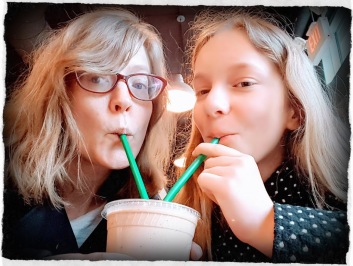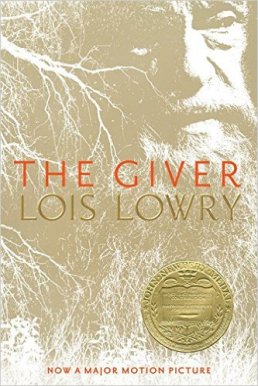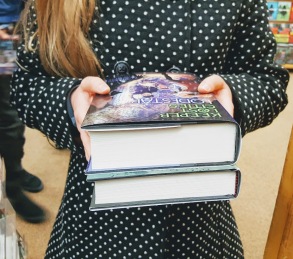When I was 13, I did not think my parents were cool. (Sorry parents.) They were parents. They existed in their uncool parental world and I existed in my eye rolling, “you don’t get it,” big bangs, Bel Biv DeVoe-loving cool world.

We didn’t watch the same TV shows. We didn’t like the same music. And we did not read the same books.
Now that I have a 13-year-old daughter of my own, I mentally prepared myself to suddenly, despite how I felt inside, be uncool. Yet, somehow, I’ve escaped the label.
Instead of being shunned, a perfectly normal trajectory for the parent of a teen by the way, my daughter actually wants to spend time with me. (Of course, I do realize the “uncool” title could be bestowed upon me at any moment.)
For now, I’ve managed to wade in the coolnesss waters for 13 whole years.
We watch the same TV shows. (Leslie Knope and iCarly forever!) We listen to the same music. And we share a love of books.
While books may not be the only reason my daughter and I get along so well, I do think they play a significant part.
It could also be because I never forced her to do this:

(Seriously, parents, if you love your children and don’t want to become material for their future psychiatrist visits, throw those matching outfits in the garbage immediately!)
Instead of forcing my daughter to wear mother-daughter outfits reminiscent of cult followers, I cultivated a love of reading from a young age.

It Started With The Giver
Many parents read books to their children. As well they should. The merits of reading to your kids have been extensively documented.
But I didn’t want to just read books to my daughter. I wanted books to really mean something to her. I wanted her to understand their importance in the world. (For an analogy, I’m sort of like a dance mom for books. A little bit crazy. Definitely overzealous. But well-meaning in my intentions.)
Therefore, one day, I suggested we read The Giver by Lois Lowry. It was a book I read in college as part of a literature course and I credit it with getting me over my snobbery of reading children’s books.
 Since I was a teen, looking into the telescope lens to the future, I wanted to rush ahead and be the woman I saw at the end. I shunned all things child-like, putting on the persona of adult well before I earned it. And that included taking all those children’s books I once loved and shoving them in a box in the basement.
Since I was a teen, looking into the telescope lens to the future, I wanted to rush ahead and be the woman I saw at the end. I shunned all things child-like, putting on the persona of adult well before I earned it. And that included taking all those children’s books I once loved and shoving them in a box in the basement.
When I read The Giver, as an adult, I realized children’s literature isn’t just for children. If we let ourselves, adults can get just as much fulfillment from children’s literature as kids. (I think most Harry Potter fans will agree.) Having been struck by the beauty and concepts of The Giver, I wanted to share it with my daughter.
I was also curious as to how she’d react. This was a heavy book, not just literally. It had dark and complex themes for a girl her age. Was I unconsciously testing her? Trying to mold a discussion partner to fill a void in my life? (Discussing books is something I crave on an intellectual level and I had not discovered my wonderful book club yet.) I’d be lying if I said there weren’t some self-centered motivations at play.
I can’t remember my daughter’s exact age when I proposed the book. I believe she was 8 or 9 years old. What I do remember is sitting in her room at night, passing the book back and forth as we read passages to each other. When we finished the book, we turned to the end and used the discussion questions to talk about it.
 My daughter was probably on the young side for the recommended reading age for The Giver. Despite my unconscious motivations, I consciously expected the discussion to be more of a teaching session, where I explained the more complex metaphors and themes to her.
My daughter was probably on the young side for the recommended reading age for The Giver. Despite my unconscious motivations, I consciously expected the discussion to be more of a teaching session, where I explained the more complex metaphors and themes to her.
How wrong I was. She didn’t need anything explained to her. She talked about society and what it means to live in a world where you have very few choices. I learned a lesson that day. Don’t ever underestimate the intuitiveness and intelligence of children.
Then Came Brown Girl Dreaming
 “Mom,” she’d said, a quick snap of a word. Even if I’m the only other person in the room and she couldn’t be talking to anyone else, my daughter starts every conversation this way.
“Mom,” she’d said, a quick snap of a word. Even if I’m the only other person in the room and she couldn’t be talking to anyone else, my daughter starts every conversation this way.
I looked up from my book and said, “Yes?”
“I think you’d like this book,” she said, folding it closed, showing me a cover of a girl’s silhouette in sunset. “It’s all poems.”
Then she said “I really like this poem. Can I read it to you?”
 We talked about her favorite poems, what they meant on the surface and what also might be hiding underneath the words.
We talked about her favorite poems, what they meant on the surface and what also might be hiding underneath the words.
She couldn’t have been more than 10 or 11 at the time and she’d already mastered forming her own, unique opinions on the meaning of poetry. More importantly, she’d initiated the discussion with me.
As I settled in next to her to talk, I also settled into our new dynamic. Our two-way street. That day books became not just a love we shared but a true conversation.
And It Evolved Into So Much More
Since then, my daughter and I continue to read books and discuss them. It’s become so commonplace, I doubt she even thinks of it as special, which is fine with me. When she groans out loud about a character doing something she thinks is “stupid,” I will ask why it upset her and I always receive the most interesting responses. It’s just another day in our family, like asking “how was your day at school.”
As she’s aged, the types of books and subjects have changed with her. We’ve evolved from Chronicles of Narnia to Percy Jackson to I Am Malala to Miss Peregrine to the Mortal Instruments series.
To discuss these books with her is to continually learn. She has a completely untarnished, unique viewpoint. She notices nuances and themes I’ve overlooked or, sometimes, become immune to as an adult.
Although, it’s possible I’ve also created a monster…these rules for borrowing her Harry Potter books are evidence.

Regardless of an over-protectiveness for her books, being able to share this passion for reading with my daughter makes me feel lucky. But it wasn’t just luck. I knew I wanted her to love books and not just enjoy stories. I wanted her to appreciate books for their potential to change the world.
And, in doing so, I also created a bond. It may not keep me “cool” forever. But I think it’s one that will have a more lasting legacy. No matter where we are in the future, we’ll always share books.














July 24, 2018 at 11:24 am
This post made my day 🖤 I have also somehow skirted by the “uncool” zone somehow, so far *knocks on wood*. Mine are 13 and 18. And while most of their time reading is spent with required reads, I am discovering that they both favor dystopian and speculative fiction! Children after my own bookish heart!
A few books we have enjoyed together here include The Chronicles of Narnia, Harry Potter and Fablehaven. I loved the Harry Potter Book Reading Rules by the way! And amen to not dressing kiddos in those matching, cultish clothes 😂🖤
LikeLiked by 1 person
July 24, 2018 at 12:12 pm
Fablehaven…I haven’t heard of that one. Will need to check it out! You’re a lucky gal to stay in the “cool” zone for so long. Or perhaps (can it be?) we can actually stay cool as parents? 🙂
LikeLike
July 24, 2018 at 1:05 pm
I do not want to speak too soon, but perhaps we are just cool 🖤😎 Fablehaven is by Brandon Mull and consists of 5 books maybe if I remember right?
LikeLiked by 1 person
July 24, 2018 at 1:20 pm
Thanks! Your taste in books is pretty awesome so I think I need to check it out!
LikeLiked by 1 person
July 24, 2018 at 11:33 am
Very awesome! Sharing books with family is a wonderful way to bond. I did get to share books with my parents, but our tastes have slightly diverged since I was an older teen. Still, there are a handful of matching books on our shelves, and we can still discuss the books we disagree on.
LikeLiked by 1 person
July 24, 2018 at 12:15 pm
That’s awesome that you can discuss books with your parents. I think diverging tastes is typical. I have a feeling my daughter will diverge past me some day. I’ll still be reading YA and she’ll have moved onto Praust or something. 😉
LikeLike
July 24, 2018 at 12:41 pm
For me, my dad is more sci-fi with some fantasy (I’m fantasy with some sci-fi) and my mom is definitely more YA. I’m not sure if she doesn’t like the adult themes, or if she just doesn’t like discussing them with her daughters, LOL. 😉
LikeLiked by 1 person
July 24, 2018 at 1:19 pm
Yes, discussing adult themes can be hard w/ your daughter. I think my daughter wishes I’d maybe talk about that LESS! 🙂 I’m all about preparing her for the future!
LikeLike
July 24, 2018 at 1:50 pm
LOL, makes sense! It’s just odd to me that we had no problem when it was a book she or my dad recommended (aka the Pern series) but when I recommend a book that has sex in it, it’s questionable whether that will turn her off.
LikeLiked by 1 person
July 24, 2018 at 4:31 pm
Parents on complicated little creatures, aren’t they. I always say, it’s really hard to raise a parent. 😉
LikeLike
July 24, 2018 at 5:02 pm
LOL! I like the way you think. 😉
LikeLiked by 1 person
July 25, 2018 at 4:36 am
YOU BOTH LOOK FANTASTIC, YOU MUST BE SO PROUD, CHINA
LikeLiked by 2 people
July 25, 2018 at 9:26 am
Yep. I have a great little (or not so little anymore) girl. 🙂
LikeLike
July 25, 2018 at 11:06 am
This is so sweet! I definitely dumped my parents into the “uncool” zone as a teen, but sharing interests with them has helped a lot. With my dad, I have more luck making him read what I’m reading, but with my mom, she’s happier if I read the books she recommends to me. Also, they both read to me a lot as a child, and I treasure those memories. I think any kid would!
I think that if you parent with an open, loving heart, your kids will naturally reach back to you. When I was a kid my parents encouraged my hobbies even when they weren’t that interested, and these days I go on walks and do zumba with my mom even though it’s not really my thing.
LikeLiked by 1 person
July 25, 2018 at 11:25 am
I’m sure I’ll end up in the “uncool” zone at some point. Still have nearly 7 more teen years. My coolness may not last. 😉 Sounds like you have some pretty great parents. 🙂 Oh zumba. That’s cute that you do zumba with your mom. Love it. (Even though you don’t love it.) You’re also obviously a great daughter!
LikeLiked by 1 person
July 25, 2018 at 4:20 pm
This is just such a lovely post. My parents aren’t really readers but my grandparents were – I miss having them around to talk to.
LikeLiked by 1 person
July 26, 2018 at 9:33 am
Thank you! 🙂 It’s nice that you were able to have that kind of relationship with your grandparents though! My mom was a big reader, but only romance. Nothing else. Couldn’t really talk to her about books either. But, we had other things (after I decided she was cool again). Ha!
LikeLiked by 1 person